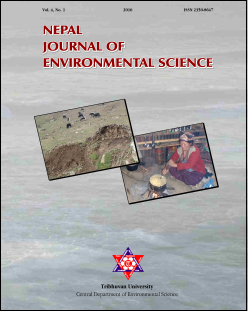Impact of elevated temperature on rice productivity: A case of Lalitpur, Nepal
DOI:
https://doi.org/10.3126/njes.v4i0.22720Keywords:
Production, Straw yield, TemperatureAbstract
Rice (Oryza sativa L.) is the second most important crop in the world after wheat and also the most important crop in Nepal. The production of rice is influenced by various biotic and abiotic factors. Temperature is the major constraint for the crop yield. The present experiment was conducted to study the impact of temperature on straw and crop productivity from June to October 2014. The experiment was conducted under temperature control chamber, in which temperature was elevated from the ambient level by 2ºC and 3ºC for the entire crop growth period. Grain and straw yield was measured using electronic weighing machine. Maturity of grain was 10 and 7 days earlier at elevated temperature by 3ºC and 2ºC respectively. Under similar condition of water depth, plant spacing, rice variety and soil nutrient, rise in temperature up to 2ºC is favorable for rice straw yield and crop productivity. Yield loss under elevated temperature by 3ºC is due to floret sterility. Further research on temperature resistance rice variety is necessary.
Downloads
Downloads
Published
How to Cite
Issue
Section
License
This license enables reusers to distribute, remix, adapt, and build upon the material in any medium or format for noncommercial purposes only, and only so long as attribution is given to the creator.

